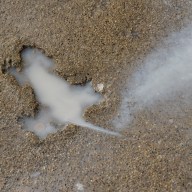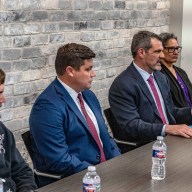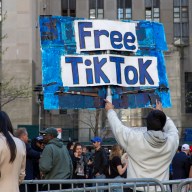“The Ultimate Fighter” quite literally brought Michael Bisping to America.
Back in 2006, Bisping was a pro mixed martial artist with 10 straight wins to his credit. But he hadn’t yet broken into the U.S.
Then came the call to try out for the third season of the popular
reality show. The rest is history for Bisping — who won Season 3’s
light heavyweight tournament, has only fought in the UFC since and will
coach the 14th season of “TUF,” starting Wednesday
night on Spike TV.
“It did enormous things for my career,” Bisping told Metro after Season
14 wrapped filming. “I got into MMA with a view of fighting in the UFC. I
was doing very well in the U.K. I had a decent pro record: 10 fights,
10 wins. Still, I fought for only a few hardcore
fans. … So I went on ‘TUF,’ and fortunately, with a good team behind
me and a lot of hard work and effort, I went on there and won the whole
show. All the UFC fans out there knew who I was. My first fight at UFC
66, I went out there and got a great reception
from the crowd. It blew my mind. Twenty-thousand people, all standing.
“If people know who you are, you’re able to make more money; more sponsors. It propelled my career tenfold.”
It’s done the same thing for dozens of fighters, and the UFC itself —
promotion boss Dana White told Metro “TUF” “was the thing that really catapulted us to
the next level.”
But what’s it really like in front of the cameras? We asked Bisping and “TUF 2” alum Marcus Davis.
Both lived in the fighters’ house as contestants, and Bisping said the
UFC puts coaches up in apartments near the training facility.
On camera, the Brit insists there is minimal interference in the show’s “reality,” outside generic B-roll shots.
“Nothing is scripted whatsoever,” he said. “I’ve been involved with the
show three times, once as a contestant, twice as a coach. Sometimes they
need to get certain shots of guys walking into the gym or whatever just
to piece things together, because they need
to get a shot in. But in dialogue or whatever, they never, ever say
‘You have to say this.’ There’s never, ever anything like that. All the
actual drama is reality, and the dialogue and fights are 100 percent
genuine, fly-on-the-wall type stuff.”
Davis, who initially impressed producers by showing off his collection
of old UFC event posters in his audition tape, bowed out early in Season
2, but said his appearance on the show “opened up a lot of doors” and
helped him eventually land a UFC deal. In his
experience on camera, there was some coaching from producers during
interview segments.
“It’s TV,” he said, “so there are circumstances that are absolutely
real, and there are circumstances I believe are somewhat manufactured. I
would say something in an interview, and they’d ask me to say it again.
I’d say it again, and they’d say ‘Say it again,
but kinda say it like this.’ Now you’re not saying what you really
said.”
And then there were those pesky scene-setting shots.
“There was one time we did … 10 takes of us just walking out of the van with our bags walking into the gym,” Davis said.
How about what goes on once they get into the gym? That’s absolutely
real — especially when Bisping is coaching. The middleweight said he
took his duties to his Season 14 fighters extremely seriously … even
with fellow coach Jason Miller acting like a “loudmouthed
idiot.”
“Whenever I signed up to do it as a coach, I’ve loved it,” Bisping said.
“Being a contestant on ‘The Ultimate Fighter’ did wonders for my
career. All these guys on the show, they’re all aspiring, up-and-coming
fighters. When I look at them, I see myself six
years ago. They all have the same heart, desires and dreams as I did
back then. I wanted to give them all the best possible chance they can
get. By going on there and not being 100 percent committed as a coach,
just turning up and getting TV camera time, it’s
not fair to them, and it’s not fair to my family.”
Bisping said this season’s workload included two hours of training in
the morning and two hours of training in the afternoon, with
responsibilities like interviews and helping fighters make weight in
between.
“It’s a hell of a lot of work,” he said. “The schedule is grueling.”
And just like at any training camp, the risks are real, too. Davis knows that better than anyone — he said he “almost died” from MRSA he contracted around the time he appeared on “TUF.”
Davis was taken to the hospital for a separated shoulder after his
Episode 4 loss to Joe Stevenson. There, he said, doctors saw “a little
red mark” on his face.
(Now it gets a little gnarly.)
“They sat me down and sliced it open,” the Mainer said. “Pus, all this
stuff comes out. It had eaten through my cheek, almost all the way to my
ear. For the next few days, I was curled up in a ball. They found MRSA
in my foot and in my face. I was on antibiotic
shots for the next two or three days. I was in nothing but absolute
pain. Deep, deep sweats. I was shaking, feeling like I was freezing all
the time, but I was sweating.”
Davis is next due in the ring this Saturday, when he meets Travis Coyle at GFL 9 in Portland, Maine.
Bisping’s next fight, of course, will be against Miller at the Season 14 finale. That, he said, is going to be personal.
“He said a lot of things that will become apparent once the show airs on TV,” Bisping said. “I’m not a man of few words, so I definitely have some choice things to say to him on the show. But come December, I get to have my real revenge.”
Courtesy, like so much for Bisping, of “TUF.”
















